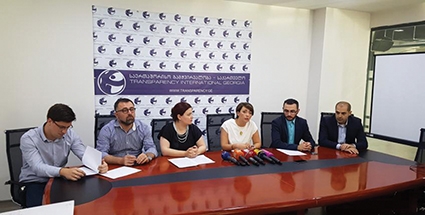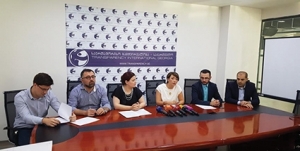30 NGOs Claim Georgian Democracy Is in Danger
Thirty Georgian Non-Governmental Organizations (NGOs) have expressed concern over the constitutional reform in Georgia that is currently being discussed in parliament.
The NGOs have sent an open letter to the High Representative of the European Union for Foreign Affairs and Security Policy, Federica Mogherini; members of the European Parliament; President of the European Council, Donald Tusk; President of the European Commission, Jean-Claude Juncker; Secretary of the Venice Commission, Thomas Markert; and the US Department of State regarding the issue, saying the actions of the ruling Georgian Dream (GD) party affect the quality of democracy in the country and is a “dangerous attempt to consolidate political power.”
In particular, the civil society organizations refer to the reform of the electoral system and the decision of GD to move to fully proportional elections in 2024 instead of 2020 as was agreed after the four-month work of the State Constitutional Commission.
“After receiving a (constitutional) majority in Parliament, GD made a pledge to launch a comprehensive constitutional reform process, which should have resulted in a refined document with a broad political consensus,” the organizations say.
The NGOs claim that the ruling party does not want to change the existing mixed proportional-majoritarian system because it favors the party in power.
“It is exactly for this reason Georgian Dream received over 75 percent of the parliament seats with only 49 percent of votes,” the letter reads.
The civil sector says that after receiving the response from the Venice Commission, which also favors moving to a fully proportional election system, the ruling party decided not only to disregard it, but also to “neglect the whole process of the work of the Constitutional Commission, to ignore the voice of civil society and all political parties and, contrary to all expectations and the initial version of the draft, to postpone the changes in the electoral system until 2024,” the NGOs claim.
“Georgian Dream decided to keep [the current system], despite the promises given to the public, civil society and all other political parties, irrespective of the several month-long work of the Constitutional Commission, that they themselves initiated, and in contradiction to the recommendations of the Venice Commission – and all this in order to retain power,” they added.
On June 22-23, amid protests from political parties, civil society organizations and even the President of Georgia, the ruling party passed the legislation with two hearings in two days during an extraordinary session of parliament. The discussions of the draft document in the Parliamentary Committees started before the Venice Commission opinion was published, the text was adopted after the first reading at the Plenary Session on June 22 and on June 23 the text was adopted at the second hearing by the relevant committee, as well as the Plenary Session on the same day.
“The text was adopted without any opposing voice heard as none of the opposition MPs were present at the session as a sign of protest to the quick speed of hearing and decision regarding the electoral system,” the NGOs stressed.
“We assess this as a clear and a straightforward attempt [at] the consolidation of power, on yet another – constitutional – level, which poses a grave threat to democracy in Georgia,” the organizations said.
The NGOs call on the EU and US structures to use all powers to help them mitigate and prevent these “unfavorable developments” taking place in Georgia, until the new Constitution is finally passed and approved in autumn.
The letter also urges addressees to deliver very strong messages to the government and ruling party that “these tendencies and inclinations towards consolidation of power are incompatible to the Western standards of democracy and are thus unacceptable.”
“We consider such behavior from a country which is considered by many as a frontrunner in the post-Soviet as well as eastern-partnership regions, establishes a bad precedent for other countries. In order to avoid further deadlock in Georgia and a negative spill-over of this precedent in the broader region, we strongly encourage you to react now,” the NGOs stressed.
Thea Morrison












